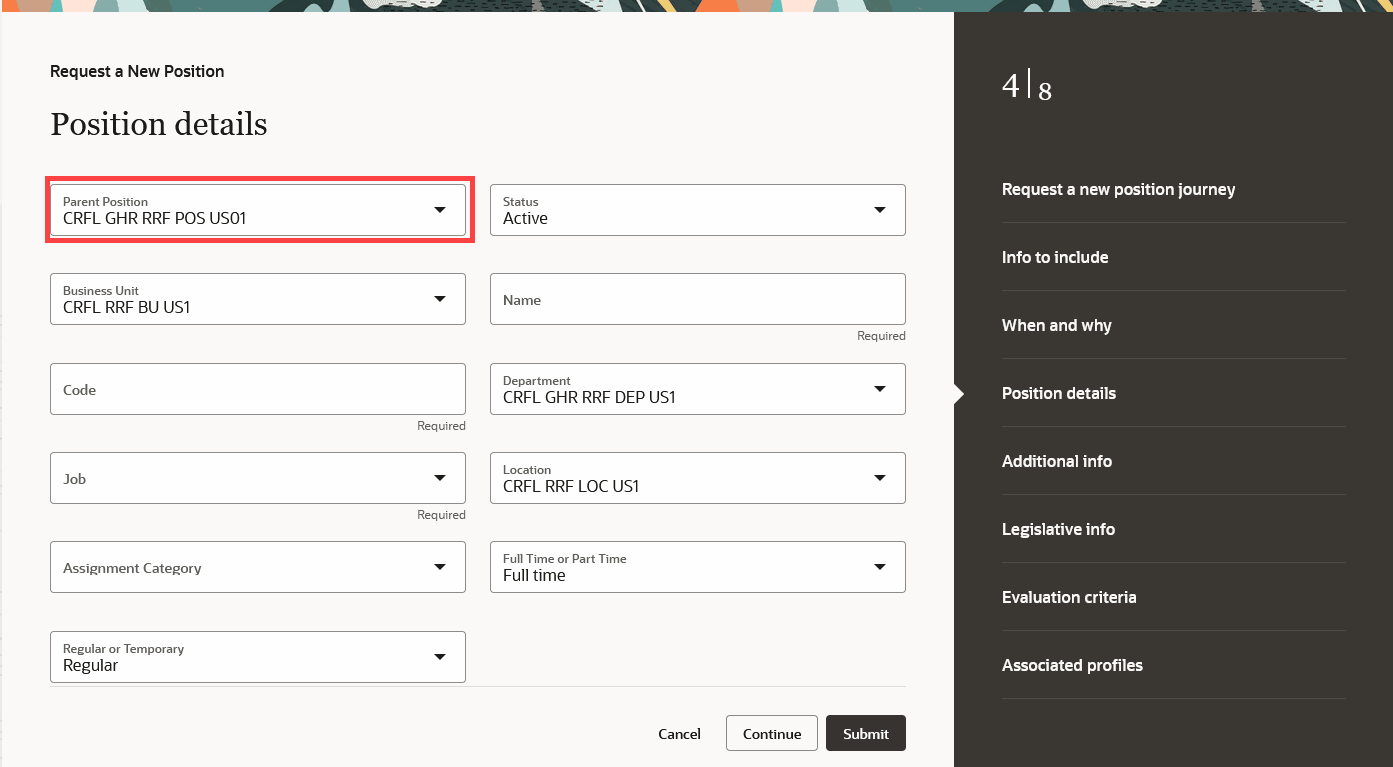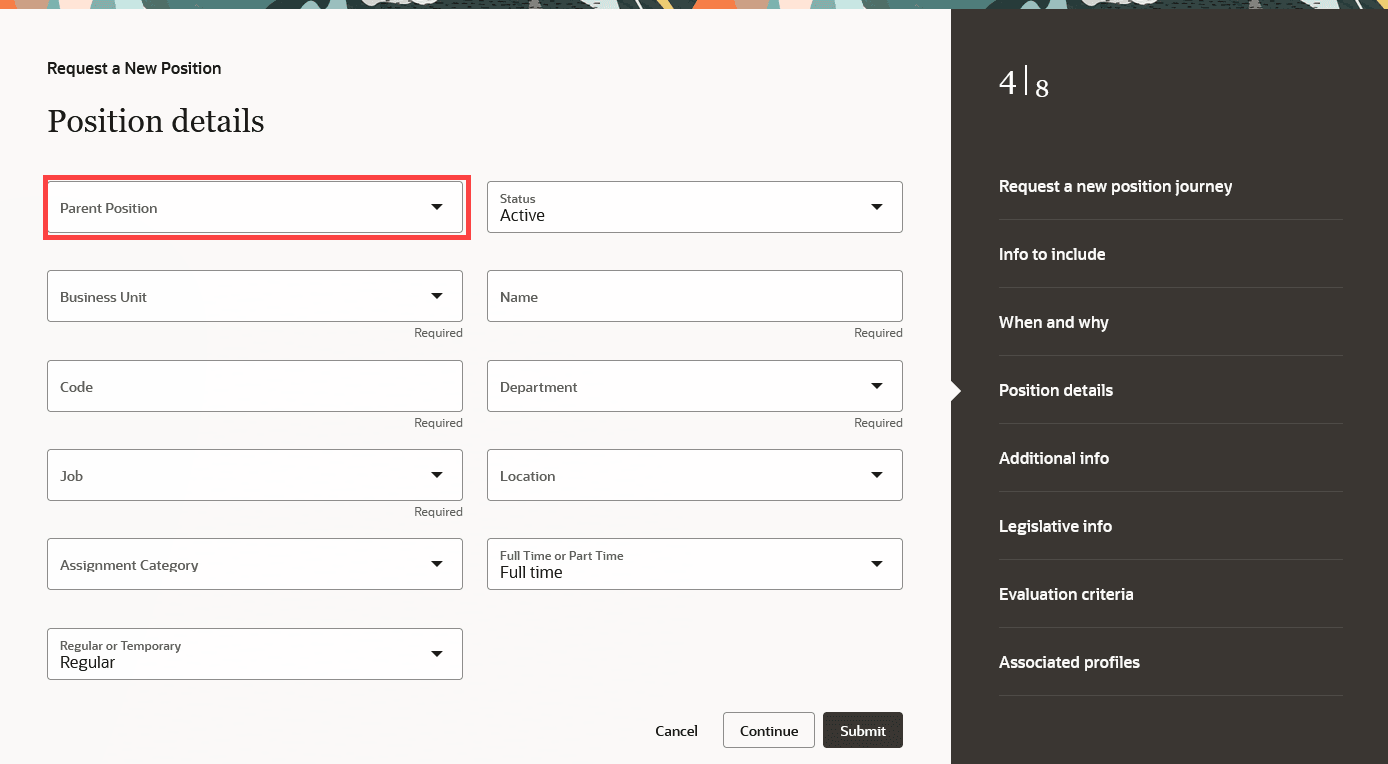No Defaulting of Parent Position for Professional Users
In the Request a New Position process and the Create Position page, the parent position is defaulted to the parent position of the currently logged in user. This helps managers as they often create a position in their team. For the professional user, it's less likely that the new position is within their own team. So we have removed the defaulting of the parent position from Position Details for the Create Position page and the Request a New Position process if it’s opened from the My Client Groups tab.
Request a New Position process
A line manager requests a new position from the My Team tab: My Team > Workforce Structures > Request a New Position
In the Position details step of the process, the parent position is defaulted from the logged-in user.

Parent Position Defaulted When Line Manager Requests a New Position
A professional user requests a new position from the My Client Groups tab: My Client Groups > Workforce Structures > Request a New Position
Here, in the Position details step, the Parent Position is blank, and it’s not defaulted from the logged-in user. You need to select the parent position from the drop-down list.

Parent Position Is Blank When Professional User Requests a New Position

Other Fields Defaulted After Parent Position Selected
In both cases, based on the parent position, the BU and department are defaulted. Based on the department, the location is defaulted. Enter all the other required details and click Submit. You can view this new position in the Positions UI.
Create Position page
Similarly, when a professional user creates a new position from the Positions quick action, the parent position isn’t defaulted: My Client Groups > Workforce Structures > Positions
In the New Position page, the parent position is blank, and it’s not defaulted to the parent position of the currently logged in user. You need to select the parent position from the drop-down list. Based on the parent position, the BU and department are defaulted. Based on the department, the location is defaulted. Enter all the other required details and click Submit. You can view this position in the Positions UI.
For professional users, selecting a parent position from the drop-down list is more useful than defaulting it to the parent position of the logged in user. That's because they would rarely request or create a new position within their own team.
Steps to Enable
- To work with the Create Position page and the Request a New Position process in Redwood, you must first enable the following profile options. They’re all disabled by default.
|
Profile Option |
Set the profile value at Site level as |
|---|---|
|
ORA_PER_POSITIONS_REDWOOD_ENABLED |
Yes |
|
ORA_HCM_VBCS_PWA_ENABLED |
Y |
|
HRC_ELASTIC_SEARCH_ENABLED |
Y |
|
ORA_PER_ORACLE_SEARCH_POSITIONSLOV_ENABLED |
Y |
To enable the profile options, navigate to the Setup and Maintenance work area:
- Search for and click the Manage Administrator Profile Values task.
- Search for and select each of the profile options listed in the table one by one.
- Select the Level as Site.
- In the Profile Value field, enter Yes or Y, whichever is applicable as described in the table.
- Click Save and Close.
NOTE: In addition, you also need to enable Oracle Search to use the position search page. Refer to the What’s New for Positions List of Values Enhanced by Oracle Search in Update 23B under HCM Common Features. When Oracle Search is enabled, the Positions List of Values (LoV) search is also automatically enabled.
Key Resources
For more information, refer to these resources on the Oracle Help Center.
- Considerations for Using Jobs and Positions topic in the Jobs and Positions chapter of the Implementing Global Human Resources guide.
- Job and Position Structures topic in the Jobs and Positions chapter of the Implementing Global Human Resources guide.
For a listing of all profile options for the recreated pages across applications, see the following document in My Oracle Support:
- HCM Redwood Pages with Profile Options – MOS Document - 2922407.1
For more information on extending Redwood pages in HCM, see the following guide on the Oracle Help Center: